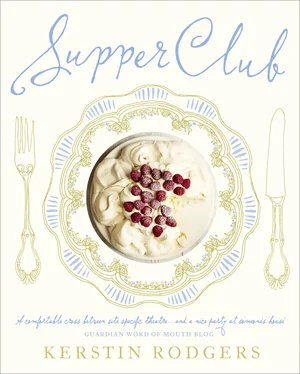Now in the confirmation e-mail I say: ‘Treat this like an invitation to a friend’s dinner party. If you can’t come, at least let the hostess know.’
So my advice is to at least take a deposit, if not to get them to pay the full amount beforehand. You can go two routes with this: they can pay directly into your bank account, in which case you are revealing your name and address. If you do not want to do that, they can pay via Paypal or a ticket seller. I started with Paypal, but I still had to respond to e-mails and their customer service is abroad. Also, let’s face it, it is a multi-national company, and part of the underground-restaurant movement’s ethos is that you are sticking it to The Man. Why sign up with a globalised corporation? It’s everything we are against.
I went with a British ticket seller: wegottickets.com. They charge ten per cent on top, to the customer not to you. There are other ticket sellers too, like brownpaper tickets, but I haven’t tried them.
You have to remember that this is still a new thing for many people. They can be quite nervous about coming and need reassurance. A ticket agency is, hopefully, reputable and gives the added guarantee that should something go wrong, the customers have a third party to complain to, get their money back from.
A good ticket agency will quickly deal with e-mails, bookings, and have English-speaking customer service. The only disadvantage is that, under British law, they will be the ones who have the mailing list, not you, and it’s an opt-in list. You need to build your mailing list for future events, so I suggest that you get a visitors’ book where people can write their comments, e-mail addresses and Twitter IDs. Or come to an arrangement with the ticket seller.
DECIDE YOUR PRICE.........................
Find out what local conventional restaurants are charging. That’s a good guideline.
While many people expect to pay less at a home restaurant – after all, you are not paying business rates and rents – at the same time you are not getting the bulk discounts and trade prices that conventional restaurants benefit from. Also, if they don’t sell a dish one night, they can sometimes sell it the next.
But remember that you are offering a unique experience that restaurants cannot offer. Don’t undersell yourself. It’s a tough balance.

Work out what you are comfortable with and stick to it. The rule is a third of your income should get used for expenditure on ingredients; a third on staff, laundry, equipment, utilities, bills, everything else; and the remaining third is profit. You probably won’t make a profit at first. In your anxiety to please, you may overspend on ingredients, buy new furniture and all sorts of equipment.
Decide on your policy about free places. I don’t give any free places except to my mother. My friends pay. The press pays. I can’t afford to give away free seats. I run a tiny little operation.
You could give discounts to friends if you like, or people could volunteer to work in exchange for dinner. I save places at cheaper rates for the unemployed. I do this for a couple of reasons: I’ve been a single mother for many years, living on very little money. I have a great deal of understanding of what it feels like to be left out of something because you simply can’t afford it. Plus I’m political, idealistic. I want the world to be a better place. That may sound mawkish but it’s true.
4 LOCATION................
As I said before, you have an advantage over a conventional restaurant. It doesn’t really matter where you are located. People are, in effect, ‘invited guests’ and you are not depending on footfall in the vicinity. In some ways, just like at the peak of the rave culture, the more obscure the location, the more exciting it is for the guests.

Are you going to have it in your home or a pop-up location? It’s easier logistically to have it at home, especially if the pop-up location doesn’t have a kitchen. You don’t have to transport all the cooking utensils, plates, silverware and ingredients to the new place.

There are plenty of locations to host pop-up restaurants: ask for the use of a café that is open only at lunchtimes and would be happy to get a little rent for the evenings, or one that is normally closed at weekends. Do a deal with a pub, ask to use their function room while they provide the drink. This would avoid licensing problems. Other ideas for locations: an art gallery, a squat, a loft, a boat, a factory, a garden or allotment if the weather is good.
Personally I prefer it in the home. Part of the excitement is the voyeurism of going into someone’s private space. I love looking at people’s houses.
It’s true however that this takes a certain amount of bravery; where you live, how you live, your cooking, perhaps even your family life, is exposed to public view and possibly public criticism. But, people are aware of that and are always – so far, in any case – very polite. To your face at least. Who knows what they say on the car ride home? But they don’t expect restaurant-level cooking and a spotless, luxury location. The kind of people who book will be adventurous, curious and flexible. They just want something authentic and some proper home cooking.
So, banishing any insecurities, think about your space, where you live, where people are going to eat. Play to its strengths...do you have a big balcony or garden? Have the drinks on the balcony, or use it for barbecue cooking. Is there something quirky or unusual about the design of your place? Do you have a large or particularly nice kitchen? Make sure you invite people to have a look.

Where are people going to eat? The likelihood is that your living room is the largest room. I had to move first one, then the other sofa into my bedroom, then the TV, then everything else. My bedroom, formerly a luxury boudoir, designed to ensnare men, now looks like a junkshop.
The look: part of the charm of a supper club is your personal style...whatever it may be. I lived for six years in Paris and one year in Provence (a cliché, but true) and I’ve been collecting vintage crockery and French kitchenalia for years, so that is part of my style, shabby chic Francophilia.
You may prefer a more modern and clean look. A friend of mine, originally from Zimbabwe, has only wooden crockery and bowls, much of it African. Her flat is like going into a little forest, full of birds’ nests and chunks of tree trunk.
If you haven’t got much money, you might go to Ikea, or your local second-hand and charity shops. Freecycle and eBay are also options for free/cheap furniture and crockery. I’ve been to squats where you drink out of jam jars rather than glasses, it was fun!
It’s about vaunting your style…you may love heavy, hand-made pottery, slate platters, silver cloches or Toby Jugs. Even if you have no style or very bad taste, that too can be part of the experience. If you are in a large city and there are several supper clubs, you will find that people will do the circuit, come around to see you all, and they want each one to be different.
Читать дальше
















